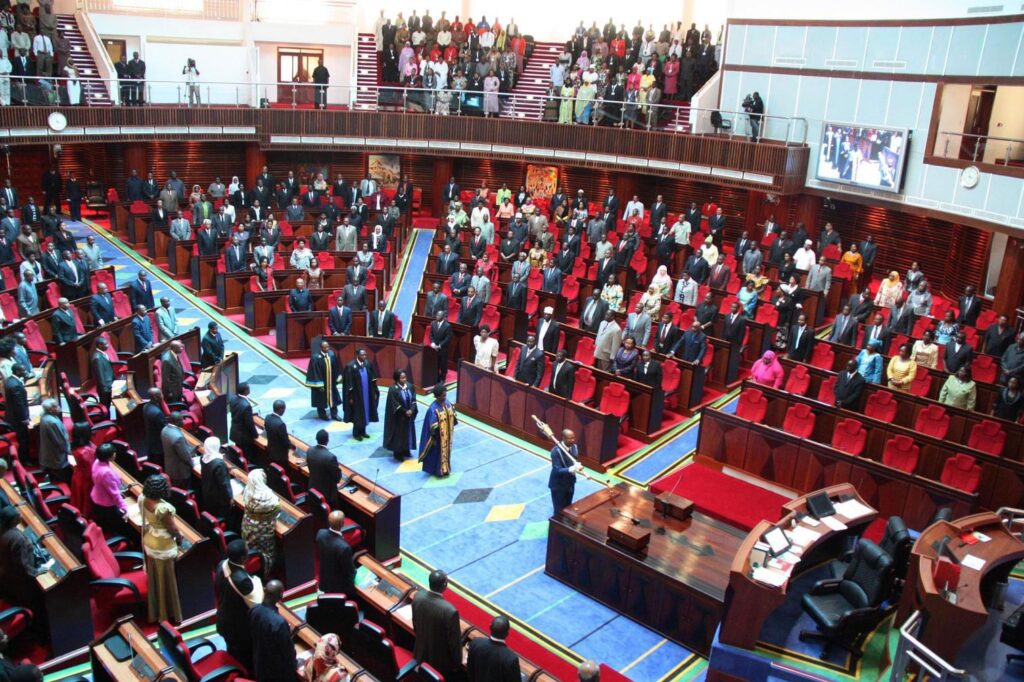World Bank warns of mounting fiscal pressure as Kenya faces debt distress risk

The lender highlights the narrowing room for manoeuvre in the country’s budget, driven by ballooning debt servicing costs, persistent revenue shortfalls and slow economic growth.
The World Bank has warned that Kenya’s fiscal health is increasingly under pressure due to a fragile economic outlook and a rising risk of debt distress.
In its latest Kenya Economic Update and Kenya Public Finance Review, the lender highlights the narrowing room for manoeuvre in the country’s budget, driven by ballooning debt servicing costs, persistent revenue shortfalls and slow economic growth.
More To Read
- World Bank urges scrapping of SHIF deductions for low-wage workers, cites threats to UHC goals
- Sh876bn fiscal deficit leaves no room for extra spending in 2025/26 budget, MPs warn
- Kenya Kwanza Government adds Sh1.4 trillion to national debt in two years
- World Bank: Africa risks missing growth dream amid rising conflict, fragile reforms
- Turkana to take over Sh2bn infrastructure project under Kenya–South Sudan Link Road Programme
- Consumers to benefit from decline in global commodity prices, says World Bank
“Kenya’s public debt remains at high risk of distress, with interest payments absorbing about a third of tax revenue,” the lender says.
It adds that public debt stood at 68 per cent of gross domestic product (GDP) in 2024, classifying Kenya as being at high risk of debt distress.
Nevertheless, it notes that despite expenditure reductions, revenue shortfalls due to sluggish economic activity have led to a higher-than-expected fiscal deficit and risks the continued build-up of pending bills.
Fiscal deficit
Kenya’s fiscal deficit is estimated at 5.1 per cent of GDP this financial year, but the National Treasury aims to reduce it to 4.5 per cent in 2025/2026.
Generally, the fragile fiscal landscape is despite improvements in some macroeconomic indicators, including declining inflation, a stabilised exchange rate and stronger international reserves, the report reads.
Speaking at the University of Nairobi during the report launch, World Bank Country Director Qimiao Fan said Kenya’s tougher economic environment is making job creation more difficult
Insufficient job creation
“Despite improvements in Kenya’s macroeconomic indicators, the country continues to face structural challenges, including insufficient job creation and low wages, especially among the youth,” Fan said.
The lender further asserts in the report that the current fiscal situation highlights significant underlying challenges.
First, it attributes the imbalances to Kenya’s unsustainable growth trajectory since the early 2010s, compounded by inefficient and distortionary fiscal policies.
Second, it points out that inadequate delivery of public services and ongoing governance concerns have eroded the social contract.
The World Bank, therefore, calls for revenue policies aimed at improving both the efficiency and fairness of the tax system.
Other Topics To Read
- National
- World Bank
- Inflation
- GDP
- gross domestic product
- debt distress
- Kenya’s fiscal health
- Kenya economic outlook
- revenue shortfalls
- macroeconomic indicators
- World Bank Country Director Qimiao Fan
- Personal income tax
- corporate income tax
- World Bank warns of mounting fiscal pressure as Kenya faces debt distress risk
- Headlines
Personal income tax
It recommends formalising the economy, making the tax system fairer by reforming personal income tax, improving tax incentives, and reducing unnecessary exemptions in both personal and corporate taxes.
The report also advocates for improving the efficiency of VAT exemptions and expanding the VAT tax base by removing exemptions that offer limited progressivity.
It also emphasises that strengthening tax compliance through improved enforcement, better taxpayer education, and simplified tax procedures would help improve the fiscal situation.
Speaking during the launch, Treasury CS John Mbadi painted a positive outlook for the country’s economic landscape, noting that Kenya’s economy is projected to grow by 5.3 per cent in 2025 and 2026.
To strengthen public financial management, Mbadi highlighted the government’s efforts to institutionalise zero-based budgeting, aiming to reshape the budgeting and expenditure framework.
He also noted that the government is accelerating the transition from cash-based to accrual-based accounting, implementing the Treasury Single Account to enhance cash management, and leveraging public-private partnerships for commercially viable projects.
Top Stories Today














































